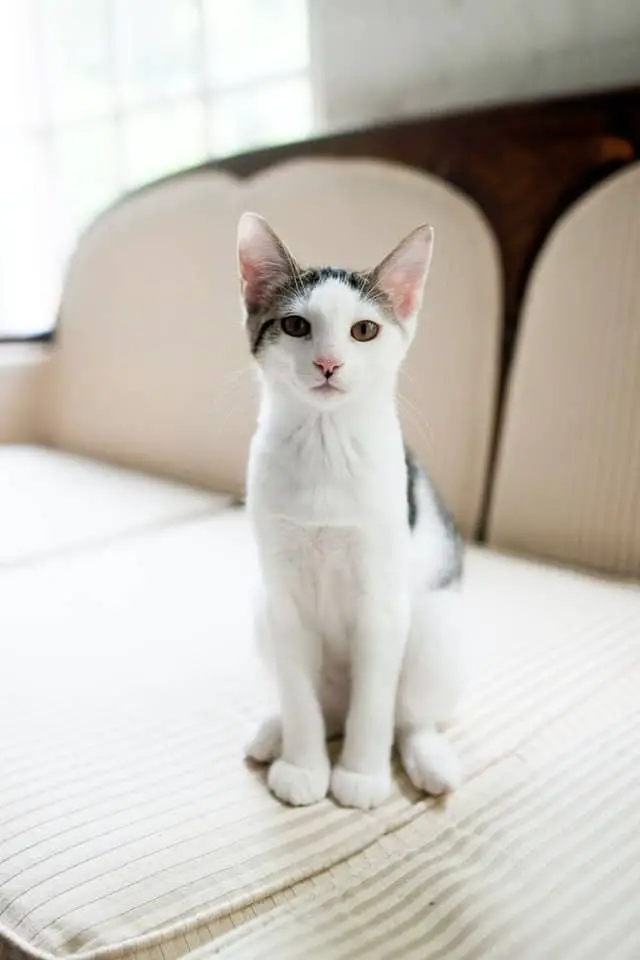
The cat that lives indoors is exposed to certain dangers. These are produced by our own cat curiosity or by our carelessness. At Petlifey, we explain many of the common dangers and how you can avoid them.
What dangers does a cat have inside the house?

The pet that lives indoors, even if it is not threatened by cars or dogs, is exposed to risks of another nature.
These are, out of your own natural curiosity and our negligence. Let’s see them:
- Some objects in the house that can be dangerous for your cat are sewing needles and pins. They can be ingested by the cat or dig into the paws.
- Plastic wrap, cellophane, and sponges are dangerous to your cat. If ingested they would cause a disaster in the intestines.
- Broken glass is always dangerous, because it can get embedded in the “cushions” of your paws and cause you a lot of pain. Its subsequent extraction is very difficult.
- Garbage must be evacuated quickly, or at least it must be kept in a tightly closed container, so that the cat cannot steal bones, cellophane and other dangerous objects.
- The ingestion of aspirin and tobacco is very dangerous for cats and precautions must be taken so that these substances are never within their reach.
- Most of the plants are toxic to cats, among them juniper and poinsettia or poinsettia. Therefore, if you have cats, do not have plants. People often do not realize that many ordinary houseplants are not only dangerous to cats, but fatal if eaten.
- Common sense advises that if you put rat poison in your subway, garage or some corner of the house you should not allow your pets to go there, but many times we forget.
- Poorly closed or open containers of paint, turpentine, plant or grass insecticides, car antifreeze, and the like are an invitation to trouble. While a cat would not intentionally ingest one of these dangerous substances, it is possible that a paw could become contaminated while passing by, which could cause secondary poisoning by licking that paw to clean it.
- Poorly sealed containers of cleaners, polishes, and similar chemicals found in bathrooms and kitchens are also invites to mishaps inside the home.
- If you have a dog, remember that certain products considered safe for dogs can be dangerous for cats. Read all instructions thoroughly before using any product. When in doubt, seek the advice of your vet.
- Do not allow your cat access to wet areas since cats are just as susceptible to colds and respiratory diseases as humans.
- Another danger for a cat indoors is the mothball. Cats love to “catch” things, hunt them, chase them, catch them with their front legs, fight with them, and bury them with their back legs. Favourite objects for these games are those like mothballs. They make noise when the cat plays with them on hard surfaces such as house floors. Although the cat will probably not try to eat a mothball, the substance in it will stick to the paws and when the cat licks it, it will ingest it and make it sick.
- Flies lay their eggs in humid areas, and since they tend to get inside houses despite mosquito nets, you should not let your cat’s wet food remain in the feeder for a long time. It is very important to remember this, especially in summer, but it is a rule that should be followed throughout the year. If the eggs hatch, the larvae that hatch from them can be very dangerous to the cat’s health. Whenever possible, prevent your cat from eating the flies that it is likely to catch.
- Although an animal kept indoors is much less exposed to fleas that a cat that lives in freedom in the open air, the house cat can always come in contact with these parasites. Fleas lay their eggs in the cat’s bed, in cracks in the ground, or anywhere else that is dry. Eggs may not hatch for a long time after laying. For this reason, the place where your cat sleeps must be kept very clean, and the blankets it uses must be washed frequently. Carefully vacuuming corners, cabinets, and rugs will help prevent such problems. Fleas are a risk to your cat’s health because apart from the irritation caused by continuous scratching, these tiny parasites can transmit certain types of worms.
The cat that lives inside the house can live (if we exclude serious diseases) a long and full life with you if it is properly cared for.
You probably have a cat because you want to have the company and the pleasure of having it with you. Show them your affection regularly and it will reciprocate in the same way; In this way, the years you share will be pleasant and enjoyable.
The house cat needs little care to enjoy its life indoors.
Its litter must be changed regularly, washing the box (with soap but preferably not with toxic disinfectant products). Provide a scratching post on which the cat can exercise and sharpen its claws. As well as some toys, fresh water, a small area that you can consider your own, and regular care to remove loose fur.






